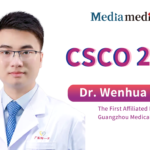
The 2024 Chinese Congress of Holistic Integrative Oncology (CCHIO) and the 4th Asian Oncology Summit (AOS), hosted by the Chinese Anti-Cancer Association (CACA) in collaboration with the Chinese Academy of Integrative Medicine and the Shaanxi Anti-Cancer Association, took place from November 14–17 in the ancient city of Xi'an. This prestigious event featured specialized summits co-organized by CACA and global cancer organizations, including the National Comprehensive Cancer Network (NCCN), Union for International Cancer Control (UICC), Society of Latin American and Caribbean Oncology (SLACOM), and International Society of Breast Disease (SIS), to foster international collaboration in cancer prevention and treatment.On November 16, the CACA-SLACOM and CACA-SIS summits brought together experts from China, Latin America, and other regions, focusing on nutritional support for cancer patients and advancements in breast disease diagnosis and treatment.
CACA-SLACOM Summit
Building a “Nutritional Defense” for Cancer Patients
With the theme “Nutrition and Oncology: Perspectives from China and Latin America”, the CACA-SLACOM Summit was chaired by Professor Hanping Shi, Vice President of CACA, and Professor Eduardo Cazap, President of SLACOM.
Moderated by Professors Lingxiang Liu (Jiangsu Provincial People’s Hospital) and Kelsy Arbiza (Uruguayan Institute of Natural Therapy), the summit featured presentations and discussions by experts in oncology nutrition.
- Professor Eduardo Cazap highlighted the challenges in implementing effective public policies for nutritional interventions in cancer care in his talk, “Nutrition and Cancer Control in Latin America: A Public Policy Challenge”. He emphasized resource disparities and low public awareness, calling for interdisciplinary collaboration to improve nutrition strategies in cancer care.
- Professor Hanping Shi delivered a keynote, “Nutrition as a Primary Treatment for Cancer Patients,” underscoring the importance of nutrition as an independent therapy comparable to surgery, chemotherapy, and radiotherapy, crucial for improving outcomes and recovery.
Other notable presentations included:



- Professor Venessa Fuchs Tarlovsky (Mexico General Hospital): “Nutritional Support to Mitigate Cancer Treatment Toxicity”, addressing how chemotherapy-induced side effects exacerbate malnutrition and reduce treatment tolerance, underscoring the need for proactive nutritional interventions.
·



- Professor Jiuhui Cui (First Hospital of Jilin University): “Exploring Cancer Cachexia Mechanisms and Interventions: From Multi-Omics to Clinical Applications”, presenting research on cachexia mechanisms through proteomics, metabolomics, and microbiomics.
In the discussion, experts agreed that unhealthy dietary habits are both a risk factor for cancer progression and a cause of cachexia, reducing treatment tolerance. They advocated for improved public health measures and clinical awareness of oncology nutrition while calling for deeper China-Latin America collaboration in this field.
CACA-SIS Summit
Global Perspectives and Advances in Breast Cancer Treatment
With the theme “Global Perspectives and Achievements in Breast Cancer Treatment,” the CACA-SIS Summit convened leading breast cancer experts to explore innovative treatment strategies. The summit was chaired by Academician Xishan Hao, Honorary President of CACA, and Professor Vahit Ozman, President of SIS.



Moderated by Professors Jin Zhang (Tianjin Medical University Cancer Hospital) and Maurício Magalhães Costa (Brazilian National Academy of Medicine), the summit featured several impactful presentations:
- Professor Vahit Ozman opened with “The Evolution and Challenges of Global Breast Cancer Treatment Strategies”, highlighting how systemic therapies have improved survival rates, expanded curative surgery options, and advanced surgical techniques.
- Professor Jian Yin (Tianjin Medical University Cancer Hospital): “A Cross-Sectional Study on Breast-Conserving Surgery in China,” revealing an upward trend in breast-conserving surgeries but highlighting regional disparities.
·

- Professor Alexander Mundinger (Niels-Stensen Clinics, Germany): “AI-Supported Breast Cancer Screening: Current Progress”, discussing AI’s potential to enhance screening accuracy and efficiency while addressing technical and ethical challenges.
- Professor Hong Liu (Tianjin Medical University Cancer Hospital): “Trends and Challenges in Young Breast Cancer Patients”, emphasizing the distinct epidemiological and prognostic characteristics of young breast cancer patients.
- Professor Schlomo Schneebaum (Israeli Society of Breast Disease): “Breast Cancer Surgery: Past, Present, and Future,” reviewing the evolution of surgical techniques and the trend toward precision surgery to minimize trauma and preserve function.
- Professor Hong Lu (Tianjin Medical University Cancer Hospital): “Comprehensive Imaging Assessment of Regional Lymph Node Metastases in Breast Cancer,” showcasing how advanced imaging technologies aid accurate diagnosis and treatment planning.
·




Discussion Highlights: Experts agreed that systemic and local treatments for breast cancer have undergone transformative changes. The development of targeted and immunotherapies has significantly improved patient outcomes, emphasizing the need for precise, personalized treatment approaches. They called for global cooperation and interdisciplinary collaboration to drive further advancements in breast cancer treatment.
Conclusion
The CACA-SLACOM and CACA-SIS summits highlighted the importance of nutrition and innovation in oncology and breast cancer treatment, respectively. By fostering international collaboration and sharing insights, these summits have strengthened the global bonds necessary to advance cancer prevention, diagnosis, and treatment.


